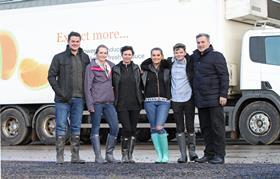
What do world-renowned comic books and a forward-thinking Scottish produce company have in common? More than you might think.
Stifresh, the marketing arm of the Stirling family farm in Montrose, has a deal in place with DC Thomson – publisher of the Beano and Dandy magazines – to use the Maw Broon name from the Broons comic strip for a branded range of produce.
The business, owned and run by husband and wife duo Andrew and Anita Stirling, along with their four children, has doubled its turnover to £3.5 million in just over six years, and is determined to grow even further.
Stirfresh grows, packs and sells potatoes, root vegetables, brassicas, and onions, among other vegetables, and also handles and distributes fruit. In Andrew Stirling’s words, the business “acts as a hub for Scottish produce, especially that not required by the supermarkets.”
It supplies schools, hospitals, care homes, ready meal companies, wholesalers, and retailers, including Aldi, and also exports a significant number of potatoes to Europe.
Recent seven-figure investments have enabled Stirfresh to become self-sufficient, with the east Scottish firm now washing, processing and packing all of its produce, which is then delivered onwards by its fleet of refrigerated vehicles.
Launched as Stirling Potatoes in the 1990s following a bad year in which the family farm was only left with potatoes, the name Stirfresh was born when the business began processing in 2000.
The business has come a long way since then, and has high hopes for its new brand, which began life in 2014.
Stirling says: “We think it will bring some fun and trust back into sales, and we are trying to persuade the public that we are the Scottish brand. We hope that when they see Maw Broon, they will get a warm feeling compared to any other packaging.
“When they buy the prepack potatoes or Maw Broon soup mixes because of their memory of the comic, they will not be let down by the quality and all the information and ideas on our website.”
Fully aware that innovation holds the key to survival in a challenging market, the Stirlings are working on adding shelf life to their range of fresh prepared produce, and hope to have packs of Scottish-grown, chemical-free, four-week-shelf-life prepared produce available for sale later this year.
Stirfresh has also started supplying the new Arbikie distillery – a business that is part of the wider Stirling family empire - with potatoes for its vodka.
Stirling, who is a director of Ringlink, the largest machinery co-operative in the UK, notes: “I hope that in the next five years we will continue our gradual expansion, and I would like to see the Maw Broon brand become a tried and trusted quality product that people like.”
Nevertheless, there will be hurdles along the way: “The biggest issue in this industry is meeting the standards required. For example, we are BRC Food Grade A, but companies including the public sector will buy from people who do not achieve these standards,” Stirling says.
“If the public sector buy Scottish the money stays in our economy, and does not go away to a multinational. This on its own will be a huge boost to Scottish farmers, who do not get paid the amount they should for their produce. The farming industry needs to set up more co-ops to sell and market their produce.”
Working alongside one of Scotland’s most famous – albeit fictional – families, the Stirlings will look to channel the famous strength-in-the-face-of-adversity spirit of the Broon family as they aim to become a familiar presence in the fresh produce world.
In his words… Andrew Stirling on:
The customer
“Our main priority is our quality and our service. If we say we will do it, we must deliver.”
Future consumers
“We need our children to be able to cook, and especially with UK produce, which is not expensive compared with some meals available to people who cannot cook.”
On ugly veg
“Flavour and quality does not always look perfect.”
On green technology
“We invested over £250,000 in solar panels to produce 30 per cent of our electricity bill.”



